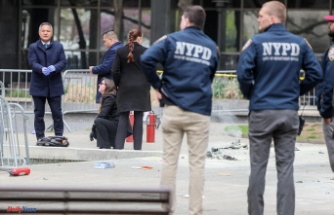Michael O'Leary is known for his striking sentences. The Ryanair boss once suggested offering standing room on his planes. Another time he called unionists idiots. And this summer, too, O'Leary knows how to surprise: he of all people, the pioneer of cheap flying, thinks flying is too cheap. It is O'Leary's way of dealing with the new reality of travel, in which nothing is cheaper, everything is more expensive.
High energy and food prices, a lack of staff in airlines and hotels, strict environmental regulations - this mix ensures that all those who are hungry for travel lose their desire for their next vacation as soon as they book it. Many will no longer be able to afford standards that they have come to love, and the downtime will inevitably become less frequent and shorter.
Especially since inflation is not the sole culprit for the rise in prices. If the federal government has its way, there will soon even be statutory minimum prices for flight tickets. Tourism is in danger of losing its status as a mass product. Traveling to distant lands could become what it once was: a luxury product.
Holidaymakers are already feeling a foretaste of what is threatening. Hotels are an average of 17 percent more expensive this summer than last year. If you reserve a room in one of the 20 most booked destinations worldwide for August, you pay an average of 139 euros per night. An evaluation by the comparison portal Check24 shows that the average price has never been higher. Flights have become more expensive by an average of 44 percent compared to the pre-Corona year 2019.
The industry is already preparing its customers for even higher prices. "The travel market will not be able to detach itself from the general inflation," says Norbert Fiebig, President of the German Travel Association. Above all, rising energy costs are having an impact. In the case of flights in particular, this is already noticeable with newly booked tickets, says Fiebig. At the end of June, kerosene was twice as expensive as a year earlier; it currently costs around 85 cents per liter. And fuel costs account for 25 to 35 percent of an airline's costs.
Inflation is no longer felt only by those tourists who book flights, transport and hotels individually, but also, little by little, by those who prefer package tours. The big tour operators like TUI already signed the contracts with hotels and airlines for this summer last year. But at popular travel destinations, the contingents secured at the time are running out.
"We then continue to buy at current rates, so increased fuel and food prices can then have a clear impact," says TUI Germany boss Stefan Baumert. The first thing you see is last-minute deals. "Higher prices of up to ten percent in this segment will not be uncommon," says Baumert.
In addition to energy costs, there is another price driver: the staff. There is a lack of employees in the tourism industry. Hotel receptions are understaffed, at airports there are long queues in front of check-in counters and security checks, and menus in restaurants are shorter because there are not enough cooks. In the end, only higher wages will probably help to make work in the industry more attractive and to attract the workers that are needed.
That too is money that every single holidaymaker has to pay. This week it became clear how much it could be about. The Ver.di union called on Lufthansa ground staff to go on a warning strike – in the middle of the summer holidays. The demand: 9.5 percent more wages. The lack of staff, the high inflation and the loss of wages during the corona pandemic put the employees under pressure, the deputy Ver.di chairwoman Christine Behle justified the surcharge.
As long as the staffing problem in the industry is not resolved, travel will not only be more expensive, but also less comfortable. Many providers cut corners when it comes to service. For example, Lufthansa has discontinued the “fast lanes” for frequent flyers at the security checkpoints at some airports. In hotels, the times for breakfast and dinner are being shortened, and the operators are asking their guests not to have the room cleaned every day.
This is still accepted by holidaymakers. According to the booking portal Expedia, the personnel problems have not yet been reflected in the hotel reviews. Around 70 percent of the reviews in Germany that were submitted in the past 30 days had a “positive tonality”. There were about the same number in the same period last year.
The explanation given by the travel professionals for the continued high level of satisfaction: many hotel employees work overtime, general managers help with check-in, and housekeeping helps with breakfast. There are even hotels that currently only occupy 70 to 80 percent of their beds because otherwise they cannot offer the service that guests are used to. The hotels cannot hold out for long - unless they adjust the room prices upwards to reflect the lower occupancy rate.
Either way, the value for money will deteriorate. The legislature could also make a contribution to this. Key word: the EU package "Fit for 55". The proposed laws are intended to help member countries reduce CO2 emissions by 55 percent by 2030 compared to 1990 levels and become climate-neutral by 2050.
The instruments include sustainable replacement fuels for kerosene on European flights. They are currently about five times as expensive as conventional fuel. It is still unclear what this means for ticket prices. "Negotiations on the 'Fit-for-55' package are currently underway, so it is currently not possible to make statements about the possible effects on individual flight prices," the Federal Environment Ministry announced. In any case, environmental regulations will make flying more expensive.
Ironically, at a time when air travel is threatening to become more expensive and rarer for average earners, politicians want to stop the remaining bargain offers. The idea laid down in the federal government's coalition agreement and supported by the German aviation industry is that tickets may no longer be sold at a price below the applicable taxes, surcharges, fees and charges. Instead of minimum prices, the EU Commission tends towards a more transparent presentation of the individual price elements. A first proposal from Brussels is expected in the fourth quarter.
Ryanair boss Michael O'Leary has already decided how cheap flying should no longer be in the future: he wants to raise ticket prices from the current average of around 40 euros to 50 to 60 euros. That would be a premium of 25 to 50 percent.
"Everything on shares" is the daily stock exchange shot from the WELT business editorial team. Every morning from 7 a.m. with our financial journalists. For stock market experts and beginners. Subscribe to the podcast on Spotify, Apple Podcast, Amazon Music and Deezer. Or directly via RSS feed.












